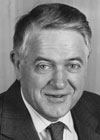Hermod Skånland
(economist, civil servant, financier) | ||||||||||||||
|---|---|---|---|---|---|---|---|---|---|---|---|---|---|---|
 | ||||||||||||||
| Born | 15 June 1925 Tromsø, Norway | |||||||||||||
| Died | 16 April 2011 (Age 85) Gran, Norway | |||||||||||||
| Nationality | Norwegian | |||||||||||||
| Alma mater | Oslo University | |||||||||||||
| Party | Norwegian Labour Party | |||||||||||||
Norwegian Central Bank Governor, Single Bilderberger
| ||||||||||||||
Hermod Skånland was a Norwegian economist and civil servant who was Governor of the Central Bank of Norway from 1985 to 1993. He attended the 1982 Bilderberg meeting. He placed great emphasis on several a more independent role (in reality run by the banksters themselves and removed from political control).
A member of the Norwegian Labour Party and a Rockefeller Fellow, his career advancement was conspicuously fast. He was to assistant secretary in 1959, and in 1960 promoted to deputy under-secretary of state. Historian Einar Lie has noted that this shuffle "gave room for Hermod Skånland, the 'wonderboy' of the economists".[1]
Contents
Education and early career
After the examen artium in 1944 and the social economics civil service exam in 1951, Skånland started in the research department of the Central Statistics Office. When the Ministry of Finance organized its own Economics Department in 1952, he became a consultant there. For the next 19 years, the Ministry of Finance was his workplace, the first years in the Monetary Policy Office.[2]
In 1955 he received a Rockefeller Fellowship to study at American universities, where he gained a deeper insight into monetary policy. When he returned home, he joined the Revenue Policy Office, where he became head of the agency in 1959. As early as 1960, he was promoted to deputy under-secretary of state for the Economic Department, a key position in the design of economic policy.[2]
Central bank deputy chairman
Skånland was an active participant in the public debate on economic policy. In 1971, Skånland became director and deputy chairman of the board of the Central Bank of Norway. In the period up to 1985, when he became governor of the central bank, he was without a doubt the most used leader for public committees. As head of the Price Problem Committee, he brought the committee together on a far-reaching proposal to formalize the cooperation between the authorities,employer organisations and unions. The proposal assumed that the parties made a long-term commitment, so when the Norwegian Confederation of Trade Unions congress in 1973 said no to this, it was not possible to follow up on the proposal. Later, Skånland has become skeptical of an wage policy that depends on agreements being adopted by primary voting in the unions. Other committees led by Skånland include the Energy Economy Committee 1975, the Credit Structure Committee 1979 and the Tempo Committee 1983 (which, among other things, put forward proposals for a petroleum fund).[2]
In Norges Bank, Skånland gradually gained a leading position, especially after Knut Getz Wold became ill. When the currency policy was changed in the autumn of 1978, Skånland won approval for its proposal to link the krone exchange rate to a basket of exchange rates weighted according to their importance in Norway's foreign trade.[2]
Central bank Governor
In 1985 he became governor of the central bank. His position had become so strong that the appointment almost became a foregone conclusion. Skånland had wanted the new law on the central bank to give the bank a more independent position in relation to the government. It has gradually happened, but in the first years he was bound to keep a politically determined low interest rate and had to supply the market with large amounts of liquidity, despite the fact that the economy suggested the opposite. In the autumn of 1992, he participated in the defense of the Norwegian krone, which was then linked to the ECU (European Currency Unit).[2]
Skånland stepped down as governor of the central bank at the turn of the year 1993/94, and was succeeded by Torstein Moland.[2]
He joined BI Business School as Professor, a position he retained until 2003. In the 1990s, he was again an active participant in the debate on economic policy. In 1998, he wrote an article arguing for a "freer" position for Norges Bank and a transition to inflation targeting for the bank. A change in this direction occurred with the parliament's decision in the spring of 2001.[2]
Hermod Skånland was appointed commander of the Order of St. Olav in 1987. He has also received several high foreign orders.[3]
Event Participated in
| Event | Start | End | Location(s) | Description |
|---|---|---|---|---|
| Bilderberg/1982 | 14 May 1982 | 16 May 1982 | Norway Sandefjord | The 30th Bilderberg, held in Norway. |